LIVE: Israel air strikes, demolitions hit Gaza despite ceasefire with Hamas
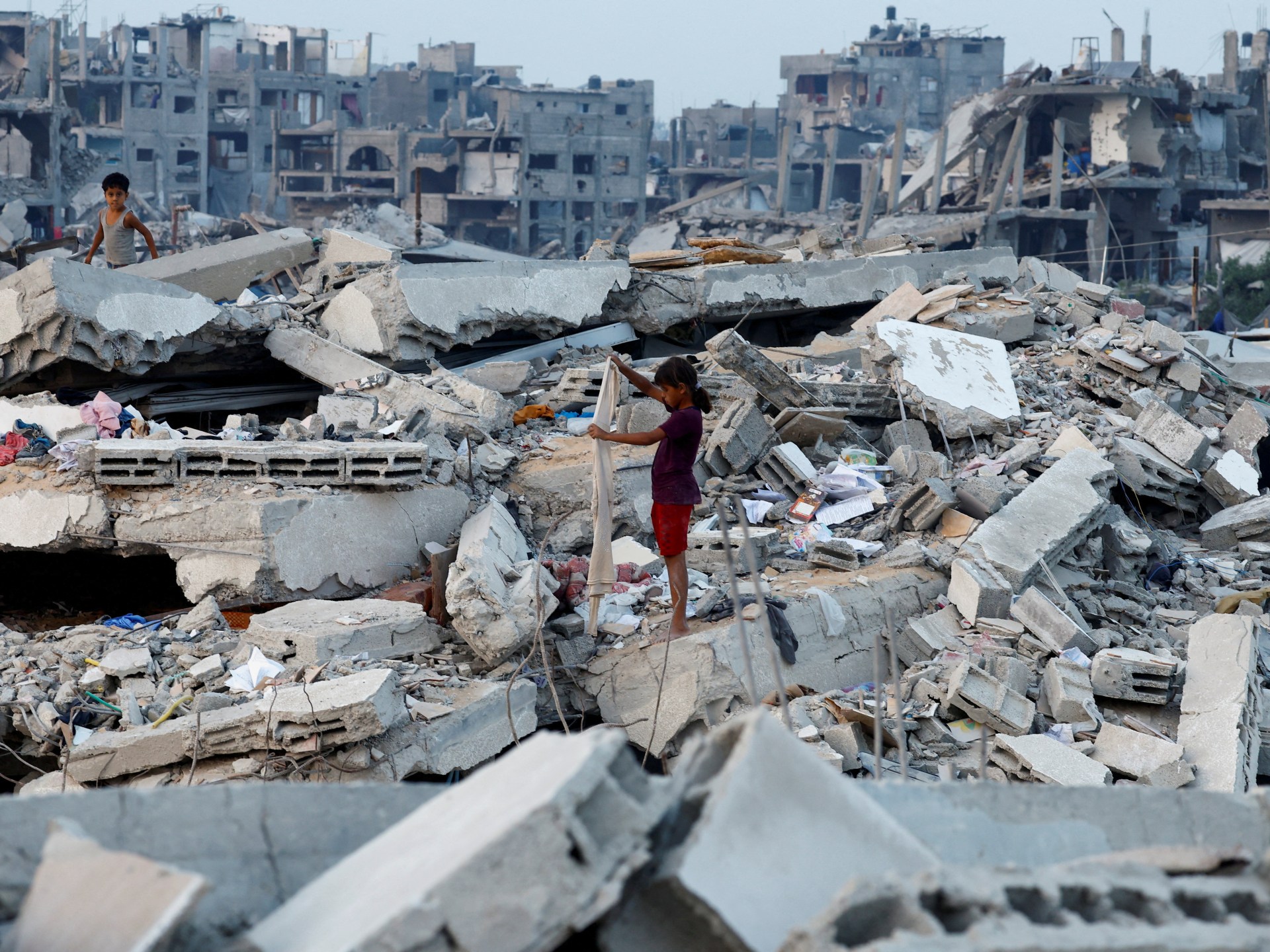

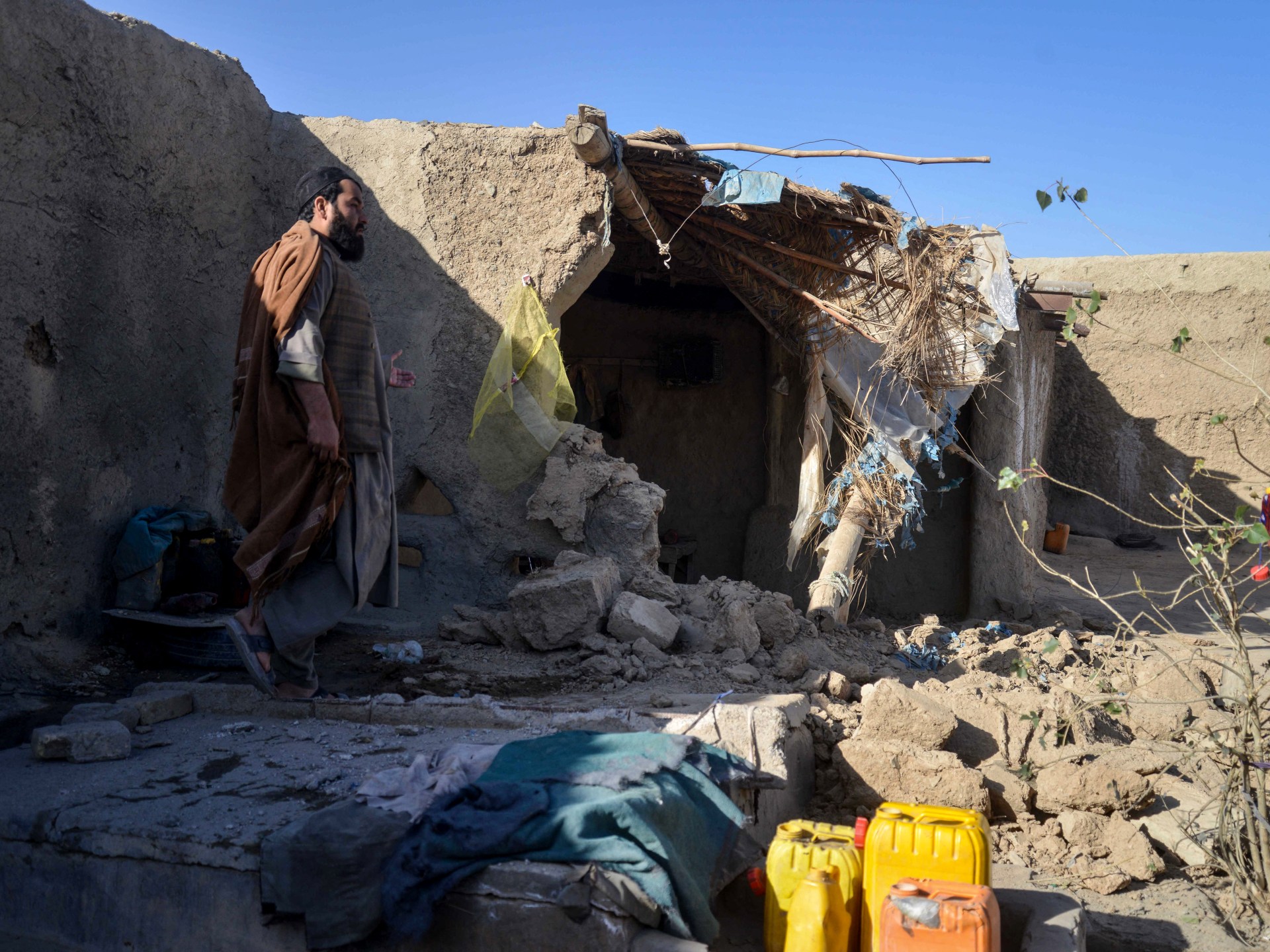
Afghanistan’s Taliban rulers have blamed Pakistan for a lack of results after mediated talks by Qatar and Turkiye in Istanbul, signalling that clashes between the two neighbouring countries may continue.
The end of the talks on Friday without any resolution came shortly after the Taliban said several Afghan civilians were killed and others were wounded in clashes along the border with Pakistan.
list of 3 itemsend of list
Two days of talks were conducted in good faith, with the Taliban expecting Islamabad to “present realistic and implementable demands to reach a fundamental solution”, Taliban government spokesman Zabihullah Mujahid said in a statement published on social media on Saturday morning.
“During the talks, the Pakistani side attempted to refer all responsibilities regarding its security to the Afghan government, while at the same time it did not demonstrate any willingness to assume responsibility for either Afghanistan’s security or its own.”
Mujahid claimed that Pakistan exhibited “irresponsible and non-cooperative attitude” which meant that there was “no outcome” from the talks.
Pakistan’s government did not immediately react to the statement.
But Pakistan had on Friday also confirmed that the talks were at a deadlock, and no real progress was made as a ceasefire brokered by Qatar remained intact.
Pakistan’s Information Minister Attaullah Tarar said Islamabad “will not support any steps by the Taliban government that are not in the interest of the Afghan people or neighbouring countries”.
Pakistan maintains that Taliban authorities have failed to honour pledges made with the international community under a 2021 Doha peace accord to combat “terrorism”.
Pakistan believes that the authorities in Kabul are harbouring armed groups, particularly the Pakistan Taliban (Tehreek-e Taliban Pakistan or TTP), which has mounted dozens of deadly attacks across Pakistan. The country has launched a series of deadly air attacks inside Afghanistan in response, and there were explosions in Kabul last month that the Taliban government blamed on Pakistan.
The Taliban denies sheltering the TTP group, and claims it remains committed to mutual security.
Mujahid said the Taliban “will not allow anyone to use Afghan territory against another country, nor will it permit any country to use its territory to take actions against or support actions that undermine Afghanistan’s national sovereignty, independence, or security”.
He said the people of Pakistan are friends and brothers, but Kabul will “firmly defend against any aggression”.
Islamabad has also thanked mediators Qatar and Turkiye for their assistance, but has emphasised that “all necessary measures” will be taken to protect Pakistan’s people and its sovereignty.
During fighting that started in early October, 50 civilians were killed and 447 wounded on the Afghan side of the border, according to the United Nations. Explosions in Kabul killed at least five people.
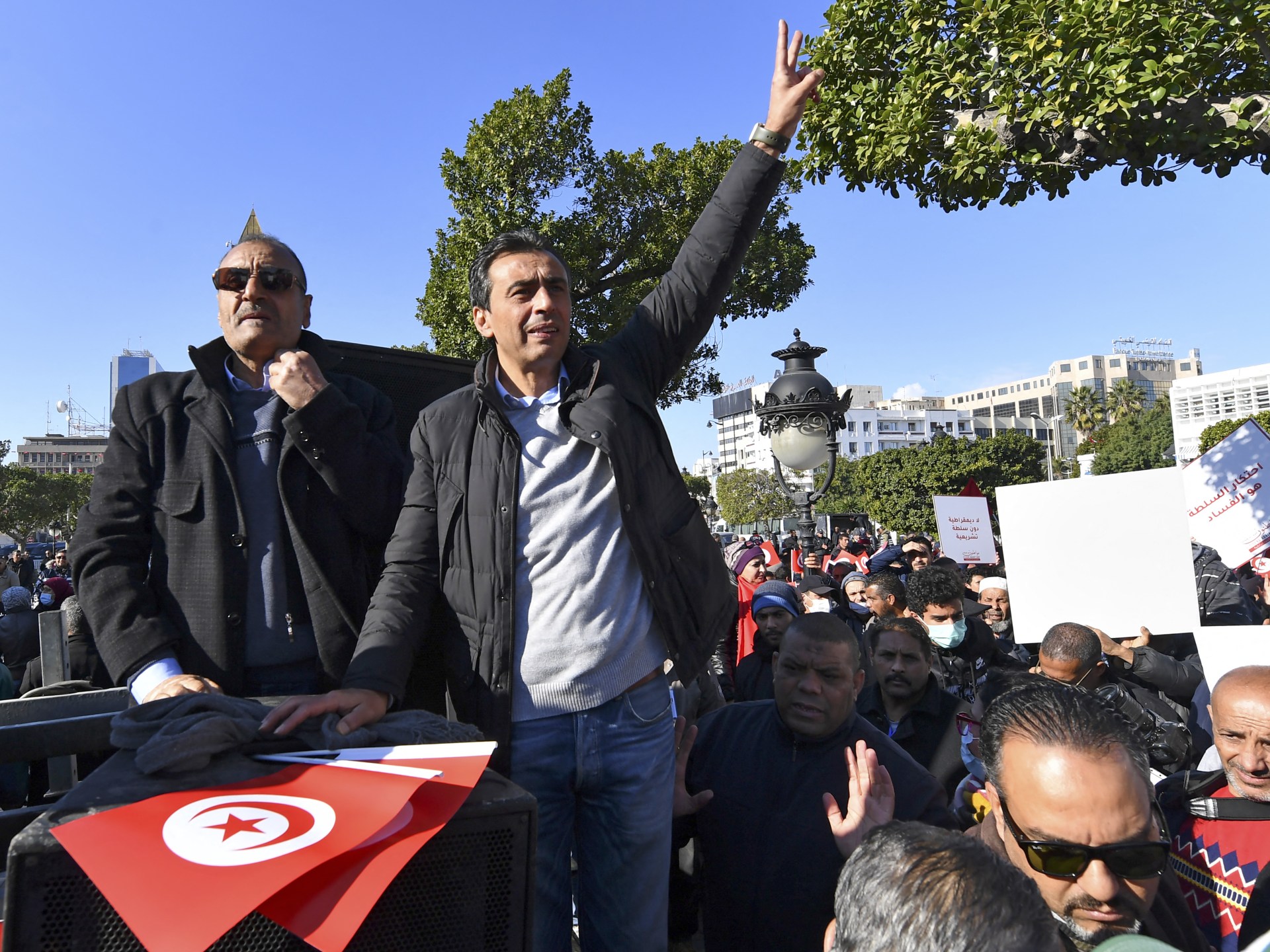
Prominent members of Tunisia’s political opposition have announced they will be joining a collective hunger strike in solidarity with jailed politician Jawhar Ben Mbarek, whose health they say has severely deteriorated after nine days without food.
Ben Mbarek, the cofounder of Tunisia’s main opposition alliance, the National Salvation Front, launched a hunger strike last week to protest his detention since February 2023.
list of 3 itemsend of list
Ben Mbarek’s father, veteran activist Ezzeddine Hazgui, said during a news conference in the capital Tunis on Friday that his son is in a “worrisome condition, and his health is deteriorating”.
Hazgui said his family would launch a hunger strike in solidarity with his jailed son.
“We will not forgive [Tunisian President] Kais Saied,” he added.
The leaders of Tunisia’s major opposition parties also declared on Friday that they would go on hunger strike in solidarity with Ben Mbarek.
Among them is Issam Chebbi, the leader of the centrist Al Joumhouri (Republican) Party, who is also behind bars after being convicted in the same mass trial as Ben Mbarek earlier this year. Wissam Sghaier, another Al Joumhouri leader, said some party members would follow suit.
Rached Ghannouchi, the 84-year-old leader of the Ennahdha party, who is also serving a hefty prison sentence, announced he was joining the hunger protest.
Ghannouchi was convicted in July of “conspiring against state security”, adding to previous convictions, including money laundering, for which he has been sentenced to more than 20 years in prison and for which he claims innocence.
A post on his official Facebook page said Ghannouchi’s hunger strike sought to support Ben Mbarek, but he was also taking a stand to defend “the independence of justice and freedom in the country”.
Ben Mbarek was sentenced in April to 18 years behind bars on charges of “conspiracy against state security” and “belonging to a terrorist group”, in a mass trial slammed by human rights groups as politically motivated.
Rights groups have warned of a sharp decline in civil liberties in the North African country since Saied won the presidency in 2019.
A sweeping power grab in July 2021, when he dissolved parliament and expanded executive power so he could rule by decree, saw Saied jail many of his critics. That decree was later enshrined in a new constitution – ratified by a widely boycotted 2022 referendum – while media figures and lawyers critical of Saied have also been prosecuted and detained under a harsh “fake news” law enacted the same year.
Most recently, lawyer and outspoken Saied critic Ahmed Souab was sentenced to five years in prison on October 31 under Decree Law 54, as the legislation is known.
The Tunisian League for Human Rights said there have been “numerous attempts” to persuade Ben Mbarek to suspend his hunger strike, but he has refused, saying he is “committed to maintain it until the injustice inflicted upon him is lifted”.
Prison authorities denied on Wednesday that the health of any of its prisoners had deteriorated because of a hunger strike.
The Arab Organisation for Human Rights in the UK said questions have been raised regarding the prison administration’s compliance with laws governing medical care for detainees on hunger strike and the “safeguarding of their right to physical safety and human dignity”.
“Tunisian law explicitly stipulates the state’s responsibility to protect the life of any prisoner, even if that person chooses hunger strike as a form of protest,” the rights group said in a statement on Friday.
“The prison administration is therefore obliged to ensure appropriate medical care and regular monitoring,” it said, adding that Ben Mbarek’s protest reflects “a broader climate of political and social tension that transcends his personal situation”.
“His action represents a form of protest against detention conditions and judicial processes that many view as influenced by current political polarisation,” the group said.
“Ultimately, the case of Jawhar Ben Mbarek exposes a deeper crisis concerning respect for the rule of law and the principle of accountability,” it added.
يواصل أستاذ القانون الدستوري جوهر بن مبارك إضرابه المفتوح عن الطعام في محبسه منذ 29 أكتوبر الماضي داخل السجن المدني ببلي (ولاية نابل)، احتجاجاً على اعتقاله فيما يُعرف بقضية “التآمر على أمن الدولة”.
وتظهر المعطيات المتوفرة أن الحالة الصحية لبن مبارك تزداد هشاشة مع استمرار… pic.twitter.com/HrHwe14juE
Translation: Constitutional law professor Jawhar Ben Mbarek continues his open-ended hunger strike in his place of detention since October 29 inside the civil prison of Belli (Nabeul Governorate), in protest against his arrest in what is known as the “conspiracy against state security” case.

North Korea’s defence minister, No Kwang Chol, has condemned the arrival of a United States aircraft carrier at a port in South Korea and warned that Pyongyang will take “more offensive action” against its enemies.
The minister’s warning comes a day after North Korea launched what appeared to be a short-range ballistic missile into the sea off its east coast.
list of 4 itemsend of list
“We will show more offensive action against the enemies’ threat on the principle of ensuring security and defending peace by dint of powerful strength,” the defence minister said, according to a report on Saturday by the North’s state-run Korean Central News Agency (KCNA).
“All threats encroaching upon the sphere of the North’s security” will become “direct targets” and be “managed in a necessary way”, South Korea’s Yonhap news agency also reported the defence minister as saying.
The missile launch on Friday followed after Washington announced new sanctions targeting eight North Korean nationals and two entities accused of laundering money tied to cybercrimes, and a visit to South Korea by US Defense Secretary Pete Hegseth.
Commenting on the visit by US and South Korean defence chiefs to the border between North and South Korea, as well as their subsequent security talks in Seoul, the North Korean defence minister accused the allies of conspiring to integrate their nuclear and conventional weapons forces.
“We have correctly understood the hostility of the US to stand in confrontation with the DPRK to the last and will never avoid the response to it,” No said, using the initials of the North’s official name, the Democratic People’s Republic of Korea.
According to KCNA, the defence minister made his comments on Friday in response to the annual South Korea-US Security Consultative Meeting (SCM) and the recent arrival of the USS George Washington aircraft carrier and the Fifth Carrier Strike Group at a port in Busan.
The arrival of the US strike group also coincides with large-scale joint military drills, known as Freedom Flag, between US and South Korean forces.
While in South Korea for the SCM talks this week, Hegseth posted several photos on social media of his visit to the Demilitarized Zone (DMZ) between the North and the South.
Hegseth said that the core of Washington’s alliance with Seoul would remain focused on deterring North Korea, although the Trump administration will also look at flexibility for US troops stationed in South Korea to operate against regional threats.
I visited the DMZ with my ROK counterpart, Minister Ahn, to meet the brave troops of the U.S., ROK, and UN Command that maintain the military armistice on the Peninsula.
Our forces remain ready to support President Trump’s efforts to bring lasting peace through strength. pic.twitter.com/Uy6gab0zwl
Pyongyang described the DMZ visit by Hegseth and his South Korean counterparts as “a stark revelation and an unveiled intentional expression of their hostile nature to stand against the DPRK”.
Pyongyang’s latest missile launch, which Japan said landed outside its exclusive economic zone, came just over a week after US President Donald Trump was in the region and expressed interest in a meeting with North Korean leader Kim Jong Un.
On Friday, the US said it was “consulting closely” with allies and partners over the ballistic missile launch.
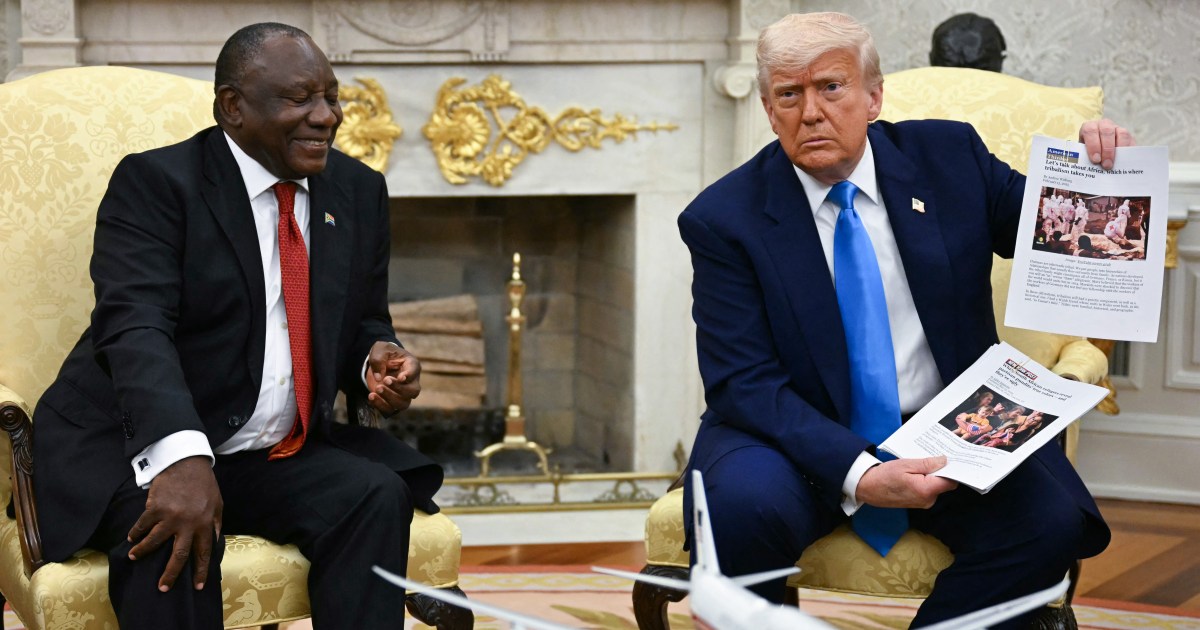
President Donald Trump has said no United States officials will attend this year’s Group of 20 (G20) summit in South Africa, citing the country’s treatment of white farmers.
Writing on his Truth Social platform on Friday, Trump said it was a “total disgrace that the G20 will be held in South Africa”.
list of 3 itemsend of list
“Afrikaners (People who are descended from Dutch settlers, and also French and German immigrants) are being killed and slaughtered, and their land and farms are being illegally confiscated,” Trump wrote, reiterating claims that have been rejected by authorities in South Africa.
“No US Government Official will attend as long as these Human Rights abuses continue. I look forward to hosting the 2026 G20 in Miami, Florida!” he added.
Since returning to the White House in January, Trump has repeatedly claimed that white South Africans are being persecuted in the Black-majority country, a claim rejected by South Africa’s government and top Afrikaner officials.
Trump had already said on Wednesday that he would not attend the summit – which will see the heads of states from the world’s leading and emerging economies gather in Johannesburg on November 22 and 23 – as he also called for South Africa to be thrown out of the G20.
US Vice President JD Vance had been expected to attend the meeting in place of the president. But a person familiar with Vance’s plans told The Associated Press news agency that he will no longer travel to South Africa.
Tensions first arose between the US and South Africa after President Cyril Ramaphosa introduced a new law in January seeking to address land ownership disparities, which have left three-quarters of privately owned land in the hands of the white minority more than three decades after the end of apartheid.
The new legislation makes it easier for the state to expropriate land, which Ramaphosa insists does not amount to confiscation, but creates a framework for fair redistribution by allowing authorities to take land without compensation in exceptional circumstances, such as when a site has been abandoned.
Shortly after the introduction of the Expropriation Act, Trump accused South Africa of “confiscating land, and treating certain classes of people VERY BADLY”.
“The United States won’t stand for it, we will act,” he said.
In May, Trump granted asylum to 59 white South Africans as part of a resettlement programme that Washington described as giving sanctuary after racial discrimination.
The same month, when Trump met with President Ramaphosa in the White House, he ambushed him with the claim that a “genocide” is taking place against white Afrikaners in his country.
Ramaphosa denied the allegations, telling Trump “if there was Afrikaner farmer genocide, I can bet you, these three gentlemen would not be here”, pointing to three white South African men present – professional golfers Ernie Els and Retief Goosen, and South Africa’s richest man, Johann Rupert.
South African historian Saul Dubow, professor of Commonwealth history at the University of Cambridge, previously told Al Jazeera that there is no merit to “Trump’s fantasy claims of white genocide”.
Dubow suggested that Trump may be more angry about South Africa’s genocide case filed against Israel in the International Court of Justice over its war on Gaza.
Nonetheless, the Trump administration has maintained its claim of widespread persecution. On October 30, the White House indicated that most new refugees admitted to the US will be white South Africans, as it slashed the number of people it will admit annually to just 7,500.
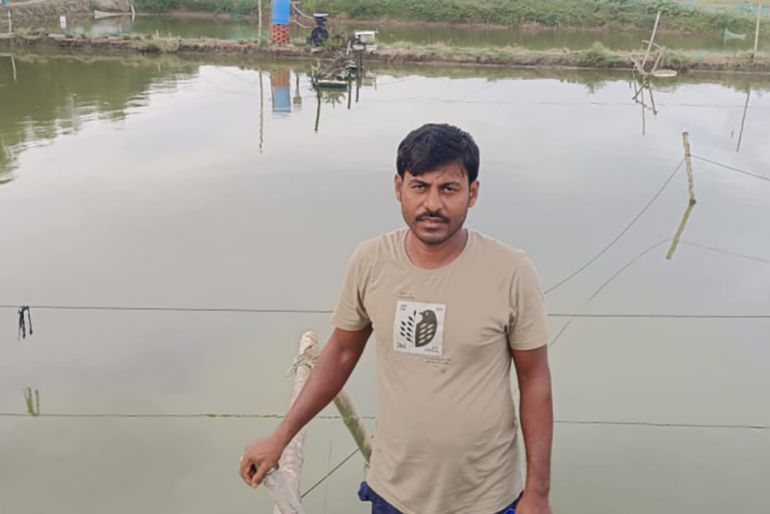
Kolkata, India: Buddhadeb Pradhan, a shrimp farmer in Nandigram in the West Bengal state in eastern India, has taken a major risk by cultivating a second shrimp crop within weeks of harvesting the first cycle.
But he needs the money and is willing to risk a diseased crop, a common occurrence when there are two harvesting cycles in a pond in the same year.
He was partly pushed into making that decision because of the falling price of the shrimp on account of the tariffs imposed on India by United States President Donald Trump.
“The falling prices of the shrimp have me stressing if I can recover my investment of 300,000 rupees [$3,380],” he told Al Jazeera.
India is the world’s second-largest producer of shrimp – predominantly for export – after Ecuador. In the financial year ending in March 2025, it sent $5bn of frozen shrimp globally, with the US accounting for about 48 percent of its sales.
It produces two commercial varieties of marine and freshwater shrimp, black tiger and Pacific whiteleg, popularly known as vannamei (Litopenaeus vannamei).
India’s shrimp production stood at 1.1 million tonnes, predominantly vannamei, but also 5 percent black tiger, in the financial year ending March 2024, as per the latest data available.
India has two distinctive shrimp cycles of vannamei, starting from February to June and then from July to October. Farmers are generally reluctant to go for a second cycle, fearing diseases. The black tiger is a single crop from March to August.
The shrimp is cultivated in the coastal states of West Bengal, Gujarat, Odisha, Andhra Pradesh, Tamil Nadu, Goa, Maharashtra, Karnataka and Kerala. The industry employs approximately 10 million people, including the shrimp farmers and people at hatcheries, processing units, and others, said Manoj Sharma, a veteran shrimp farmer.
Since the tariffs were announced in May, farm prices of shrimp dropped from 300 rupees ($3.38) per kilogramme to 230 rupees ($2.59) as farmers tried to offload whatever they had. With production costs at 275 rupees ($3.10) per kilogramme, losses are mounting.
Nardu Das, 40, a shrimp farmer in Nandigram, told Al Jazeera that farmers might be forced to consume “poison” if the market doesn’t stabilise and prices do not increase.
The 40-year-old said shrimp farming is a costly affair with bills for power, lease on land, feed and other expenses.
“The farmers not only risk their savings but also take loans with the hope of massive returns. But diseases and the fall in prices often push them to the brink of poverty,” he said.
Farmers are worried that with tariffs at 58.26 percent – including countervailing duties of 5.77 percent and anti-dumping duties of 2.49 percent – they will lose their US market.
“The US is a preferred destination for shrimp exporters because of easy market access, higher growth prospects, better profit margins, and repeat customer approvals. The hike in tariffs will discourage farmers from continuing to invest in shrimp culture that also incurs upfront costs of land lease, seed and feed,” said Rahul Guha, senior director of Crisil Ratings.
India brings its brood stock – the term for the mother shrimp – in chartered flights from the US to breed to produce seeds for farming. But there have been cases where it is either of poor quality or unfit for the Indian environment, in turn leading to disease among the shrimp produce, which then has to be thrown away.
“We have been demanding the government to breed the shrimps using the local brood stock in order to get the high-quality seeds that adjust to our conditions,” said IPR Mohan Raju, president of the Prawn Farmers Federation of India.
Another spillover of the tariffs has been on hatcheries. India has about 550 private hatcheries that depend on these shrimp farmers for their livelihood.
Several farmers, fearing a further dip in prices of shrimp, have stopped buying seeds, and at least half the hatcheries have already shut down, said Ravid Kumar Yellanki, president of All India Shrimp Hatcheries Association.
“Undoubtedly, the US tariffs have begun to have a major impact on the hatcheries, with many halting production,” Yellanki said.
These hatcheries produce approximately 80 billion seeds annually and have drained seven to eight billion seeds in the past four months due to no demand from the farmers, as the shelf life of seeds is just three to four days.
“It would be a major loss to the hatchery owners if the situation doesn’t turn normal soon,” Yellanki added.

India is already facing stiff competition from Ecuador, which has been expanding its share of the US market due to its geographical proximity to the US.
Ecuador produces high-quality vannamei shrimp at a lower price, as that is its domestic species. Plus, tariffs on it are at 15 percent, much lower than India’s, making it a more attractive market for the US to source from.
During the first nine months of 2025, Ecuador exported 1,038,208 metric tonnes of shrimp to the US, up 14 percent year-on-year, with a total value of $5.51bn, representing a 23 percent increase compared with the same period last year.
Sharma, the aquaculture expert, says the US tariffs will force Indian exporters to compete among themselves to sell to alternate markets.